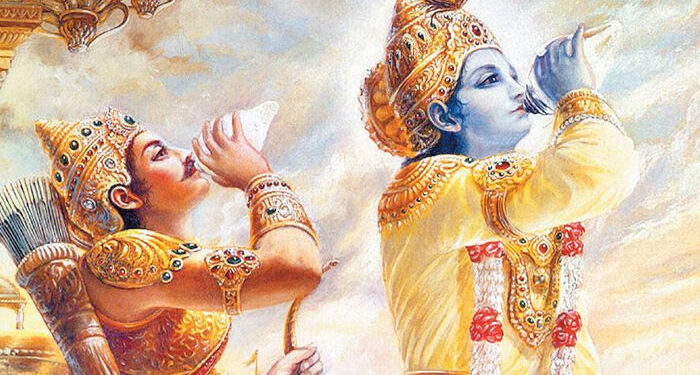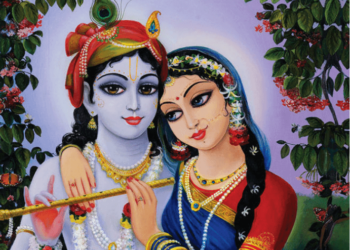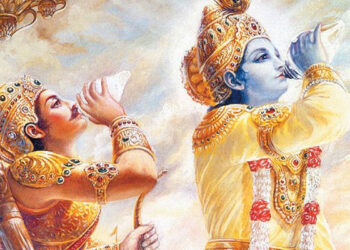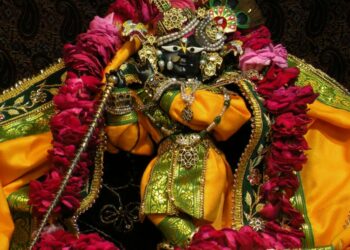TEXT 1
sañjaya uvāca
taṁ tathā kṛpayāviṣṭam
aśru-pūrṇākulekṣaṇam
viṣīdantam idaṁ vākyam
uvāca madhusūdanaḥ
SYNONYMS
sañjayaḥ uvāca—Sañjaya said; tam—unto Arjuna; tathā—thus; kṛpayā—by compassion; āviṣṭam—overwhelmed; aśru-pūrṇa-ākula—full of tears; īkṣaṇam—eyes; viṣīdantam—lamenting; idam—these; vākyam—words; uvāca—said; madhu-sūdanaḥ—the killer of Madhu.
TRANSLATION
Sañjaya said: Seeing Arjuna full of compassion, his mind depressed, his eyes full of tears, Madhusūdana, Kṛṣṇa, spoke the following words.
PURPORT
Material compassion, lamentation and tears are all signs of ignorance of the real self. Compassion for the eternal soul is self-realization. The word “Madhusūdana” is significant in this verse. Lord Kṛṣṇa killed the demon Madhu, and now Arjuna wanted Kṛṣṇa to kill the demon of misunderstanding that had overtaken him in the discharge of his duty. No one knows where compassion should be applied. Compassion for the dress of a drowning man is senseless. A man fallen in the ocean of nescience cannot be saved simply by rescuing his outward dress—the gross material body. One who does not know this and laments for the outward dress is called a śūdra, or one who laments unnecessarily. Arjuna was a kṣatriya, and this conduct was not expected from him. Lord Kṛṣṇa, however, can dissipate the lamentation of the ignorant man, and for this purpose the Bhagavad-gītā was sung by Him. This chapter instructs us in self-realization by an analytical study of the material body and the spirit soul, as explained by the supreme authority, Lord Śrī Kṛṣṇa. This realization is possible when one works without attachment to fruitive results and is situated in the fixed conception of the real self.
TEXT 2
śrī-bhagavān uvāca
kutas tvā kaśmalam idaṁ
viṣame samupasthitam
anārya-juṣṭam asvargyam
akīrti-karam arjuna
SYNONYMS
śrī—bhagavān uvāca—the Supreme Personality of Godhead said; kutaḥ—wherefrom; tvā—unto you; kaśmalam—dirtiness; idam—this lamentation; viṣame—in this hour of crisis; samupasthitam—arrived; anārya—persons who do not know the value of life; juṣṭam—practiced by; asvargyam—which does not lead to higher planets; akīrti—infamy; karam—the cause of; arjuna—O Arjuna.
TRANSLATION
The Supreme Personality of Godhead said: My dear Arjuna, how have these impurities come upon you? They are not at all befitting a man who knows the value of life. They lead not to higher planets but to infamy.
PURPORT
Kṛṣṇa and the Supreme Personality of Godhead are identical. Therefore Lord Kṛṣṇa is referred to as Bhagavān throughout the Gītā. Bhagavān is the ultimate in the Absolute Truth. Absolute Truth is realized in three phases of understanding, namely Brahman, or the impersonal all-pervasive spirit; Paramātmā, or the localized aspect of the Supreme within the heart of all living entities; and Bhagavān, or the Supreme Personality of Godhead, Lord Kṛṣṇa. In the Śrīmad-Bhāgavatam (1.2.11) this conception of the Absolute Truth is explained thus:
vadanti tat tattva-vidas
tattvaṁ yaj jñānam advayam
brahmeti paramātmeti
bhagavān iti śabdyate
“The Absolute Truth is realized in three phases of understanding by the knower of the Absolute Truth, and all of them are identical. Such phases of the Absolute Truth are expressed as Brahman, Paramātmā, and Bhagavān.”
These three divine aspects can be explained by the example of the sun, which also has three different aspects, namely the sunshine, the sun’s surface and the sun planet itself. One who studies the sunshine only is the preliminary student. One who understands the sun’s surface is further advanced. And one who can enter into the sun planet is the highest. Ordinary students who are satisfied by simply understanding the sunshine—its universal pervasiveness and the glaring effulgence of its impersonal nature—may be compared to those who can realize only the Brahman feature of the Absolute Truth. The student who has advanced still further can know the sun disc, which is compared to knowledge of the Paramātmā feature of the Absolute Truth. And the student who can enter into the heart of the sun planet is compared to those who realize the personal features of the Supreme Absolute Truth. Therefore, the bhaktas, or the transcendentalists who have realized the Bhagavān feature of the Absolute Truth, are the topmost transcendentalists, although all students who are engaged in the study of the Absolute Truth are engaged in the same subject matter. The sunshine, the sun disc and the inner affairs of the sun planet cannot be separated from one another, and yet the students of the three different phases are not in the same category.
The Sanskrit word bhagavān is explained by the great authority Parāśara Muni, the father of Vyāsadeva. The Supreme Personality who possesses all riches, all strength, all fame, all beauty, all knowledge and all renunciation is called Bhagavān. There are many persons who are very rich, very powerful, very beautiful, very famous, very learned, and very much detached, but no one can claim that he possesses all riches, all strength, etc., entirely. Only Kṛṣṇa can claim this because He is the Supreme Personality of Godhead. No living entity, including Brahmā, Lord Śiva, or Nārāyaṇa, can possess opulences as fully as Kṛṣṇa. Therefore it is concluded in the Brahma-saṁhitā by Lord Brahmā himself that Lord Kṛṣṇa is the Supreme Personality of Godhead. No one is equal to or above Him. He is the primeval Lord, or Bhagavān, known as Govinda, and He is the supreme cause of all causes:
īśvaraḥ paramaḥ kṛṣṇaḥ
sac-cid-ānanda-vigrahaḥ
anādir ādir govindaḥ
sarva-kāraṇa-kāraṇam
“There are many personalities possessing the qualities of Bhagavān, but Kṛṣṇa is the supreme because none can excel Him. He is the Supreme Person, and His body is eternal, full of knowledge and bliss. He is the primeval Lord Govinda and the cause of all causes.” (Brahma-saṁhitā 5.1)
In the Bhāgavatam also there is a list of many incarnations of the Supreme Personality of Godhead, but Kṛṣṇa is described as the original Personality of Godhead, from whom many, many incarnations and Personalities of Godhead expand:
ete cāṁśa-kalāḥ puṁsaḥ
kṛṣṇas tu bhagavān svayam
indrāri-vyākulaṁ lokaṁ
mṛḍayanti yuge yuge
“All the lists of the incarnations of Godhead submitted herewith are either plenary expansions or parts of the plenary expansions of the Supreme Godhead, but Kṛṣṇa is the Supreme Personality of Godhead Himself.” (SB 1.3.28)
Therefore, Kṛṣṇa is the original Supreme Personality of Godhead, the Absolute Truth, the source of both the Supersoul and the impersonal Brahman.
In the presence of the Supreme Personality of Godhead, Arjuna’s lamentation for his kinsmen is certainly unbecoming, and therefore Kṛṣṇa expressed His surprise with the word kutaḥ, “wherefrom.” Such impurities were never expected from a person belonging to the civilized class of men known as Āryans. The word Āryan is applicable to persons who know the value of life and have a civilization based on spiritual realization. Persons who are led by the material conception of life do not know that the aim of life is realization of the Absolute Truth, Viṣṇu, or Bhagavān, and they are captivated by the external features of the material world, and therefore they do not know what liberation is. Persons who have no knowledge of liberation from material bondage are called non-Āryans. Although Arjuna was a kṣatriya, he was deviating from his prescribed duties by declining to fight. This act of cowardice is described as befitting the non-Āryans. Such deviation from duty does not help one in the progress of spiritual life, nor does it even give one the opportunity to become famous in this world. Lord Kṛṣṇa did not approve of the so-called compassion of Arjuna for his kinsmen.



















